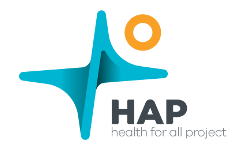Interview with Riccardo Curatolo-a Swiss volunteer in Albania
- How would you describe your experience with HAP and your overall experience in Albania?
To be honest, I imagined life and work to be very different here in Albania than it is. Whereas in some matters Swiss people are quite the same as Albanians for other matters we could not be further away from each other.
In the beginning of my experience with HAP I was warmly welcomed by the team and Cyril, a Swiss Civil Worker. It was he who helped me in my transition into the Albanian way of life to the point when I was left alone to embrace the culture of coffee drinking and kissing family members at least eight times; the usual norm for greeting one another.
Thanks to HAP I was able to have a closer look into the Primary Health Care System of Albania by reading and discussing relevant topics as well as meeting family doctors and hearing about their acute problems with which they were presently struggling. I was so thankful for all the co-workers who helped me in the first place with translating Albanian into English. This enabled me to fully participate in the discussions with the Family doctors. Unfortunately, in March COVID forced us to stay at home. During quarantine I was not able to see much of the country itself, but I had some time to work from home for HAP, as well as proceeding with my Albanian language course, which I really loved. The last two weeks of my stay in Tirana were just lovely, as we could go for some after-work drinks again in the very beautiful and surprisingly very green city.
- You have worked closely with family doctors from both HAP regions and paid site visits in several HCs. What is your impression of the service being delivered and the expertise of PHC professionals?
After having had ongoing contact with the Health System in Albania for some months, I am very proud of the Family doctors who are engaged in the project regions of Fier and Diber. It was empowering to see how invested and motivated family doctors were, knowing that it is not easy to work in a system which is still struggling very much. During the meetings with workers, some aspects were often discussed more emotionally while other aspects were adopted immediately. In the end, it must be highlighted that these Family doctors do an essential work and we need just to empower and support them, to give them their confidence and let them practice good evidence-based medicine. I deeply believe that this confidence will be supported if a continuous education is in place and the Family doctors could continuously educate themselves giving them more power in the Health System of Albania.
- What is your message to everyone who is considering doing their internship or voluntary work in the healthcare sector in Albania?
I really recommend this practice to everyone who can pursue such an internship or voluntary work in Albania. First of all, Albania has so much to offer in terms of visits to nature and historic sights. Secondly, to get to know a country, which is within the European borders, yet so far away from us, is just a really helpful experience. Knowing another culture helps one to understand the behavior and mentality of others. It also gives you another view of Health Systems and lets you question the Health System in your own country and the nearby countries. Furthermore, there is nothing better than living in a foreign country, learning a new language, getting to work with professionals from different locations, understanding their mentality and traditions and to have a really nice after-work drink in City Art next to the office, to end a week of hard work now accomplished.

